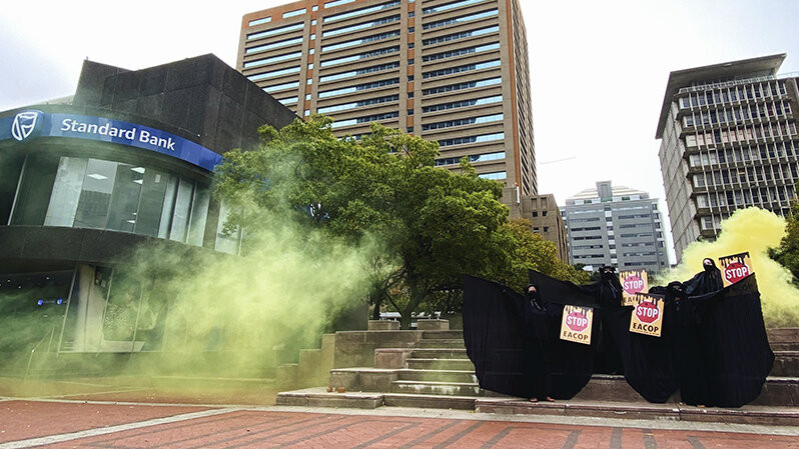Standard Bank delays response to shareholders on tabling advisory resolution on climate risk

On 23 April 2021, three asset manager shareholders in Standard Bank – Aeon Investment Management, Abax Investments, and Visio Fund Management – together with shareholder activist organisation Just Share, co-filed a non-binding advisory shareholder resolution ahead of the bank’s annual general meeting (AGM) on 27 May 2021. In their non-binding advisory resolution, the shareholders make the following recommendation and request:
In order to promote the long-term success and sustainability of the Company, taking into account the significant risks and opportunities associated with climate change, and in accordance with the Company’s stated support for the goals of the Paris Agreement, shareholders recommend and request that the Company and its Directors include, in its reporting to shareholders for the year ending 31 December 2021, the Company’s plans, if any, to set and publish a strategy, and short-, medium-, and long-term targets, to reduce its exposure to fossil fuel assets on a timeline aligned with the goals of the Paris Agreement (the “Paris goals”).
The resolution was filed 23 working days before the AGM. The JSE’s Listing Requirements only require 15 working days’ notice for ordinary resolutions. The co-filers would have liked to provide Standard Bank with more time to consider the resolution, but this was not possible as there had been no indication, prior to the bank’s 31 March Notice of AGM, that the AGM would be scheduled for 27 May. Previous indications were that the AGM would be held on 29 June.
Standard Bank has not yet indicated whether it will table the resolution.
Why was the resolution filed?
Standard Bank has released a Coal-Fired Power Finance Policy (July 2019), and a Thermal Coal Mining Policy (March 2020). In December 2020, the bank released its first climate-related financial disclosures report, guided by the recommendations of the Task Force on Climate-related Financial Disclosures (TCFD), and a Fossil Fuels Financing Policy.
Standard Bank’s reporting acknowledges that climate change is material and poses significant risks, including to its ability to generate value for its shareholders over time. In each of the TCFD Report, the Fossil Fuels Financing Policy, and the Thermal Coal Mining Policy, Standard Bank also states that it supports the goals of the Paris Agreement.
However, none of the bank’s disclosures provide any strategy or measurable targets that show how, and when, it will align its financing with this stated commitment to the Paris Agreement’s goals. This is in stark contrast to Nedbank, for example, which recently released an Energy Policy targeting zero fossil fuel exposure by 2045, and including specific short-, medium-, and long-term deadlines for doing so.
In order to better appraise the long-term investment proposition, investors require more information to understand what steps Standard Bank is taking, if any, to reduce its exposure to fossil fuel assets in the short-, medium and long-term, on a timeline aligned with the Paris goals.
Legal opinion on shareholders’ rights to file climate change-related shareholder resolutions
Following Standard Bank’s refusal to table a climate risk-related shareholder resolution in 2020, Just Share has received a legal opinion from Advocates Tembeka Ngcukaitobi SC and Chris McConnachie, on shareholder rights to file climate risk-related resolutions.
The opinion concludes that:
- The Companies Act, 71 of 2008, in section 7, specifies that the Act must be interpreted in a manner that promotes compliance with the Bill of Rights, and in accordance with a number of other purposes of the Act, including encouraging transparency and high standards of corporate governance.
- Climate change is a serious human rights issue, which poses particularly severe risks to South Africa’s ability to develop in a sustainable and inclusive manner.
- The aims of promoting transparency, sound corporate governance, and balancing the rights of shareholders and directors, would all be best promoted by allowing shareholders to call for further information, particularly on climate change and environmental, social, and governance (ESG) issues.
- The international movement towards greater corporate disclosure of greenhouse gas (GHG) emissions, climate risk, and strategies and targets for decarbonisation, shows that disclosure is viewed as a necessary requirement, both to protect human rights, and to safeguard shareholders’ investments.
- Barring shareholders from proposing any resolutions on climate change and ESG matters would not best promote the Bill of Rights or the section 7 purposes of the Companies Act, and would be out of step with the company laws in other comparable common law countries.
- Directors do not have a unilateral discretion to refuse to table shareholder-proposed resolutions on content-based grounds.
- If there are disagreements over the validity of a resolution, those disagreements should arguably be aired at the shareholders’ meeting and put to a vote. At the very least, directors should go to court to seek an order blocking the resolutions.
- The courts are likely to find that shareholders are entitled to file binding resolutions relating to disclosure on climate change matters.
Robyn Hugo, director of climate change engagement at Just Share, says: “Standard Bank is Africa’s biggest lender by assets, and it is poised to facilitate significant fossil fuel expansion on the continent. This is at odds with the bank’s repeated statements that it is committed to the Paris Agreement goals. Without a strategy, and measurable targets, it is impossible for shareholders to evaluate the strength of the bank’s commitments to align its lending activities with Paris. This non-binding resolution simply calls for the bank to disclose whether it has any such strategy and targets. There is no reason why Standard Bank should not already have agreed to table it, and embarked on the administrative process of notifying shareholders of the change to its proxy voting form.”
